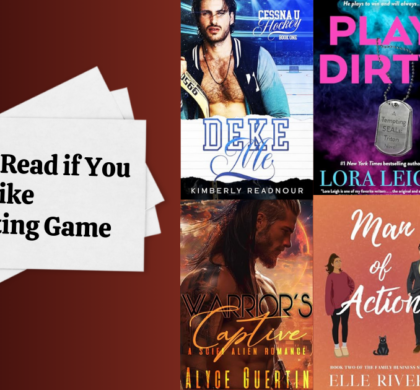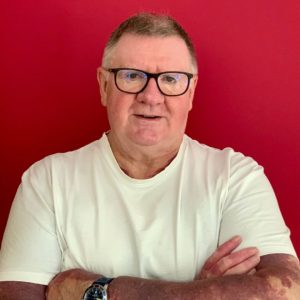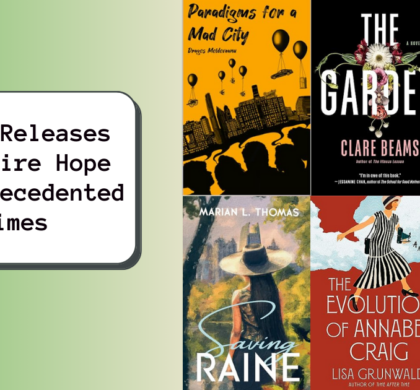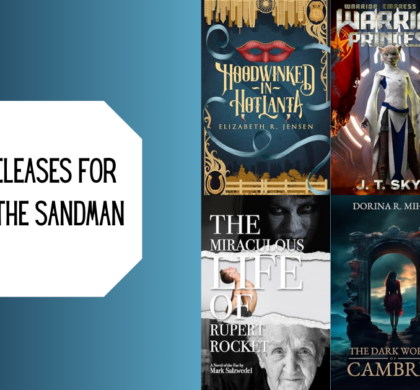Interview with Andrew Rylands, Author of The Forgotten God
05 Oct 2021
What’s the story behind the story? What inspired you to write The Forgotten God? From a young age, I wanted to write, but I could never find a subject or theme that was sufficiently powerful or convincing enough to hold a story together, or which could hold my interest over a sustained period. Time and again ideas came to naught but half a dozen pages of notes or feeble early drafts, so after a while I gave up and got on with a different kind of life. In retrospect, I don’t think I’d experienced enough of the things that life throws at you to be able to feel or develop an authentic voice. I have now. In the past decade, my life has changed profoundly, and now, writing is my respite, my relief, and in some ways the only thing that helps me keep ahead of the demons. So, what happened? Death happened, and loss and a mountain of grief that almost overwhelmed me and still periodically buries me under its crushing weight. In early 2014 my wife first detected a lump in her breast. Thirty months later she was dead, and the truly happy family life that we’d shared was lost forever. I am grateful, in retrospect, that we had twelve months of respite in the middle of that period. Twelve precious months where hope briefly reigned and we dared to look forward. But the shadow hanging over us descended all too quickly, and the ending was awful. How can you ever rid yourself of the memory of having to tell a 13-year-old boy to say goodbye to his mother for the last time or the look on his face? It wasn’t like the movies or TV. Sue’s cancer spread to the hippocampus; the area of the brain that controls speech. For the last week of her life, she was unable to form sentences and she couldn’t get across much of what she wanted, and I struggled to interpret what she was trying to say. Instead, we spoke in gestures – a squeeze of the hand – but she was in too much pain for me to give her a hug. Even that, most basic of human gestures, was denied. So much that we took for granted was lost. Her last day will remain etched on my memory forever. Sitting by her hospital bed in quiet despair. Unable to get up beside her; there was simply no room. Reduced to holding hands and talking to her, not knowing if any of my words were getting through. Struggling to come up with things to say amid the anguish. All-day she was unconscious, wracked by pain then put under by heavy doses of morphine. The moment it started to wear off she thrashed and moaned until she was submerged by the drug once again: there was no alternative. There was no last loving conversation, no shared recollection of those precious memories like our first kiss, our first date, our special places and what made them so, and all the beautiful things that touched our lives, chief of which was our wonderful boy. \Instead it was a lonely vigil and monologue, a desperate attempt to give her hope and reassure her that all those she loved would be OK. Bearing witness all day to my heart’s love on her last journey into the dark. So, I have to write. I have no choice. For a long while, it was the only thing that gave me forward momentum and kept me moving around the edge of the black hole of grief and loss that was always alongside. Writing helped me steer to safe ground. What began as a letter to my lost love as I started to remember all the things I’d wanted to say to her on that last day, but couldn’t because my brain froze, became a grief diary; a daily compendium of miscellanea and messages, thoughts and fears and hopes for our son. Eventually, I dug out an old story, one that started as a children’s bedtime tale, and without any particular plan in place, I began to flesh it out. Finally, I had lived enough and experienced enough to enable me to write. Finally, I had my voice. But what emerged was no longer a children’s tale, but something a little different. It took me a while to realize. There were many drafts and multiple edits, but coming back to it after a period of doing something else made me realize that The Forgotten God is, in one way, the story of a bereavement journey; a survivor’s tale. At least in part. It is also, hopefully, an enjoyable romp through modern-day Athens in the company of some of mythology’s most enduring and beloved characters in unusual guise, and I believe that the message that comes out of it (without wishing to sound pretentious) is one of hope. Loss exists. It is part of the human condition. I am well aware that grief is not just my preserve. If ever I needed reminding, this pandemic has reinforced the message. I am also painfully aware that my experience is not particularly special or unique; it has been replicated millions of times over, across the world. How we respond to it is the key. Look forwards and onwards, it is what our loved ones would want. Above all, remember just how special are those who remain. It can be hard, this life, but our loved ones help us through, and it is my firm belief that in the deep dark waters through which we sometimes move, jewels shine, and hope endures. What inspired you to write The Forgotten God? “I want a story,” he was adamant. “Read a book.” “I’ve read them. All of them.” “You can’t have.” “He’s quick,” admitted his mother, in a distracted way, lying on the bed in our rented room, and leafing through the Rough Guide. We were in Kalabaka in Greece in 2011, halfway through a whirlwind tour of the central part of the country. It was evening, at the end of a long day of monastery visits, and we were all pretty tired, but our digs were quite spartan, and there was little by way of entertainment for a child. Irritatingly, we had underestimated our youngster’s appetite for reading and had run out of material. But it was bedtime and he should be exhausted, why couldn’t he just go to sleep? “Tell me a story!” He was insistent in that way only children know. “Yes, tell us a story,” said his mother, looking up with a mischievous glint in her eye. That was how it started: from a challenge. The bedtime story became a recurring theme for the remainder of the trip. When we returned home, encouraged by Sue, I scribbled the tales down as best I could, then over a few months worked on them some more. Looking back, they were wretched, but my wife seemed to see something in them and encouraged me to keep going. However, real-life got in the way, and they became forgotten, residing on a remote corner of a hard drive, never looked at from one month’s end to another, until many years later, after everything else turned my life upside down, and with a three-month gap between work contracts looming and nothing better to fill the days, I dusted them off and had another look. I decided to flesh out the half-remembered storylines and try and weave them toward a satisfying conclusion, in the process starting to learn how to write. Many days were lost in research, but after three months, to my surprise, I had the first draft of a full-length novel. In the intervening years, my life had changed dramatically, and inevitably the tales evolved and became somewhat darker, and more nuanced. What I now had was no longer a children’s story, and as the cast of characters wandering through my thoughts grew, it was apparent that one book could not contain them all. A series beckoned. Where, and how will they all end up? I’ve got an inkling, but it’s not all set in stone, and there may be some unexpected twists and turns along the way. I hope you will join me on the journey to find out. It should be fun. Welcome to The Reawakening. If The Forgotten God is turned into a movie, who would you pick to play Apollo? Ooh, that’s a tough one! I love the most recent version of The Lion King and the superb animation techniques used, and The Forgotten God would need a similar treatment, so the actor selected would have to be great at voiceovers. Perhaps James Earl Jones, who played Mufasa in The Lion King? Joaquin Phoenix would bring out the complexity in the character, I’ve no doubt, and Keanu Reeves would be nicely understated. But, heck, why not have Brad Pitt! What books are on your TBR pile right now? The pile keeps growing – there aren’t enough hours in the day, but I have really enjoyed the recent spate of retellings of Greek and other mythologies. Circe and The Song of Achilles are among my all-time favorite books, and I’ve loved dipping into Mythos and Heroes by Stephen Fry. His most recent, Troy, is definitely on the list. I love delving into Fantasy, and thoroughly enjoyed getting lost in the labyrinth of The Starless Sea by Erin Morgensten, so I need to go back and read The Night Circus. I’m also keen to read The Bone Ships by RJ Barker. I also love anything by Benedict Jacka and Genevieve Cogman, and I need to read more of their respective series. Another writer I’m in awe of is China Mieville, and having read Perdito Street Station and The Scar I need to complete that trilogy by reading Iron Council. What book should be required reading for all humans? Winnie-the-Pooh by A A Milne. Funny, brilliant, subtle, deeply insightful … I could go on. It is majestic. Milne was a genius. What’s your favorite thing about writing? What’s your least favorite thing about it? I love getting lost in the flow, where the magic of the story starts to take hold and you’re just clinging on, seeing where it takes you. That sensation isn’t something I can force, and most days are more workmanlike, but those periods where the story takes on a life of its own are wonderful; the plot takes an unexpected turn, a character does something unexpected, an unforeseen event explodes the plot lines completely. At moments like these, writing is special. However, they are far from being the norm, and there are plenty of days where inspiration ceases to flow, and everything becomes forced. At those times it can be a struggle, and you just have to plough on through. What’s the best advice you’ve ever received? It may sound a bit downbeat, but it’s probably a quotation from Churchill: “If you’re going through hell, keep going.”
Sign up for our email and we’ll send you the best new books in your favorite genres weekly.
Related
grant
Recommended Posts

Books to Read if You Like The Hating Game
19 Apr 2024 - Books to Read if You Like..., eBook, News, Romance



